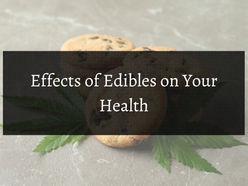THC vs THCA - Educational Guide for Patients
- Green Leaf

- Jun 27, 2023
- 4 min read
There are over 100 different cannabinoids in the cannabis plant—each with its own unique properties—but even regular cannabis consumers may not fully understand the differences between chemical compounds like THCA and THC.
Just as THC and CBD produce different effects in the body (and give consumers quite a different experience), THCA and THC have distinct therapeutic properties and psychological effects. For medical cannabis patients, understanding the respective properties and effects of THCA and THC can help you find the products that work best for your health condition and personal goals.
THCA vs THC: What Is the Main Difference?
The main difference between THCA and THC is that whereas THCA is an “inactive,” non-psychoactive cannabinoid that’s found in raw and freshly harvested cannabis, THC is the psychotropic or “active” version of the same cannabinoid that only appears when raw marijuana plant material is heated.
Essentially, THCA—which stands for tetrahydrocannabinolic acid—is the precursor to THC, which stands for tetrahydrocannabinol. The cannabis plant produces THCA, CBDA (the acidic version of CBD), and other cannabinoid acids. In fact, there is little to no THC present in “live” or raw marijuana.
Does THCA Give You A High Like THC?
In its acidic form, THCA doesn't bind effectively to the brain's CB1 or CB2 cannabinoid receptors. The ability or inability to fit into a CB1 receptor determines whether a cannabinoid produces a high; THC does, and THCA doesn’t.
Important note: Although THCA doesn't produce a high, consuming THCA or other cannabinoids may still cause you to fail a drug test. If your workplace tests for marijuana regularly, find out whether there are workplace protections available for medical marijuana patients in your state—such protections exist in Arizona, for example—and if applicable, apply for or renew your medical marijuana card.
How Is THCA Converted Into THC?
THCA is converted into THC, the most psychoactive compound found in cannabis, through a process called decarboxylation, or "decarbing". Through a chemical reaction caused by exposure to heat, the THCA molecules lose their carboxylic acid group and turn into regular THC, which is the form that interacts directly with your endocannabinoid receptors and causes a high.
How Does Decarboxylation Occur?
THCA-to-THC decarboxylation occurs in two primary ways:
Combustion, which occurs instantly when you smoke, dab, or vape marijuana
Heating cannabis intentionally to temperatures of around 230-250 ºF for 20 to 30 minutes (for example in an oven or crockpot) to convert THCA into THC
Potential Benefits of THCA
Both THCA and THC offer therapeutic benefits to patients with a range of health conditions. However, unlike THC, THCA offers potential therapeutic benefits without the high.
THCA has:
Anti-inflammatory properties that may help to treat or improve the symptoms of arthritis, lupus, and fibromyalgia
Neuroprotective properties that might help to slow the progression of neurodegenerative diseases such as Alzheimer’s Disease
Antiemetic properties that improve vomiting and nausea, which is why a lot of people take medical marijuana for chemotherapy-related nausea
Anti-proliferative properties that may help to alleviate symptoms of cancer, especially prostate cancer
In addition, THCA:
May help to prevent metabolic disease caused by diet-induced obesity, as well as fatty liver disease
Is an antioxidant
Potential Benefits of THC
THC offers many of the same potential benefits as THCA, plus some additional benefits. Further potential advantages of THC include:
Analgesic properties
Antispasmodic properties, meaning that it helps with muscle spasms
Helps to improve sleep (in the short term)
Vasodilation, which may go some way to reducing pain and eye pressure caused by glaucoma
Relief from anxiety symptoms (when taken in small amounts)
The consumption of medical cannabis (that contains THC) is associated with a reduction in the use of opioid-based pain medications.
As we stated earlier—and as MMJ patients would already know—THC is the main cannabinoid in marijuana that produces intoxicating effects. When discussing treatment options with your doctor, it’s important to take these effects into consideration along with the potential benefits of THC.
Delivery Methods for THCA and THC
Due to the fact that THCA is present in raw cannabis plants and THC requires decarboxylation, the delivery methods are slightly different for each of these two cannabinoids.
Delivery Methods for THCA
If your doctor determines that THCA would be helpful for your health condition, you can find this cannabinoid in:
Tinctures made with raw (unheated) cannabis extracts
Capsules
Topicals
Fresh cannabis juice
Delivery Methods for THC
THC is easier to find because most cannabis products are made for a mixed medical/recreational audience or are ingested via combustion (i.e. smoking, vaping, or dabbing). Patients for whom THC could be helpful can consume this cannabinoid by:
Smoking cannabis flower
Vaping marijuana oil
Dabbing cannabis concentrates
Ingesting THC-infused edibles and beverages
Taking pre-decarbed sublingual cannabis tinctures
Swallowing pre-decarbed full-spectrum cannabis oil capsules
If you’re ever unsure whether a product contains THCA and/or THC—and how much—ask to see the certificate of analysis. This should state the cannabinoids that the product batch contains and the percentages or amounts of each.
Both THC and THCA Can Provide Valuable Benefits to MMJ Patients
THC and THCA are closely-related cannabinoids that are differentiated by the presence or absence of the carboxylic acid group. The acidic version of the cannabinoid (THCA) is present in raw cannabis and turns into THC through a process of decarboxylation.
For medical marijuana patients, THCA and THC offer several benefits that are similar and others that are distinct. If you are looking for therapeutic benefits without the high, ask your doctor about the suitability of THCA-containing products for your health condition.
Alternatively, if you have a condition that would be better served by consuming THC—or you enjoy its psychoactive effects—ask your doctor which form, dosage, and frequency of consumption would bring the greatest benefits to your health.




















I’ve bookmarked this site for future reads. Anyone needing weed for sale will love this dispensary!